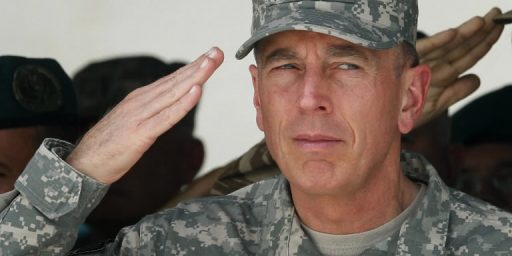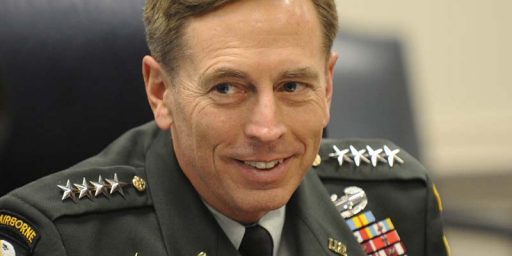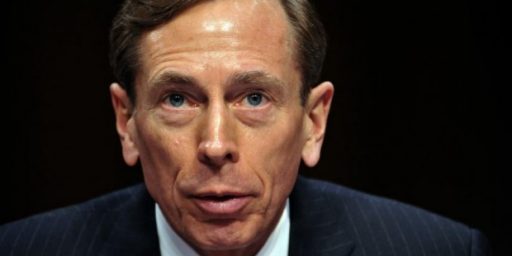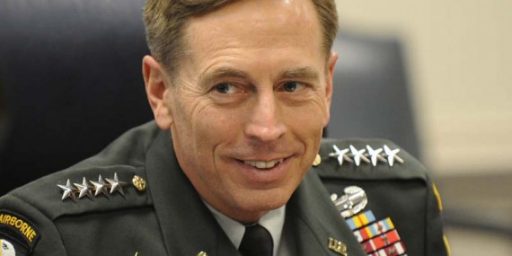Petraeus: Iraqi Leaders Not Making ‘Sufficient Progress’
General David Petraeus has stated the obvious:
Iraqi leaders have failed to take advantage of a reduction in violence to make adequate progress toward resolving their political differences, Gen. David H. Petraeus, the top U.S. commander in Iraq, said Thursday.
Petraeus, who is preparing to testify to Congress next month on the Iraq war, said in an interview that “no one” in the U.S. and Iraqi governments “feels that there has been sufficient progress by any means in the area of national reconciliation,” or in the provision of basic public services.
Giving the Iraqis time to cobble together a functional unity government out of a broken sectarian mess was the rationale given for the Surge. There’s no indication that it’s happening or will suddenly happen any time soon. At the same time, there is very real progress, whether directly attributable to the Surge or not. Violence has decreased markedly. Infrastructure building is taking place. And civil society seems to be springing up organically at the village-tribal level.
The question remains, as it has for too long now, what to do about a bad situation. The answer seems unchanged: muddle through and hope for the best.
While John McCain is the staunchest advocate of that policy — although he wouldn’t describe it quite that way — it’s essentially the policy of Hillary Clinton and even Barack Obama once we get beyond rhetoric. It’s not much of a policy, frankly, but it’s the best we’ve got.
Despite the sense by some in the blogosphere that this is some sort of “gotcha” moment or admission against interests, it’s nothing more than a statement of what everyone knows. So, why bother to articulate it now?
My guess is that Pat Dollard is on to something: “Whenever Petraeus or other Higher Elements of forward command use the Washington Post like this, it’s not so much to inform you and me, it’s primarily to send a message to Maliki and company.”
Is Petraeus’ latest attempt to light a fire under their fourth points of contact likely to work? It hasn’t previously, so I wouldn’t hold my breath. But, again, the options are limited.






Nice posting. There’s also the lowering of expectations here. Some benchmarks are being met, but Petraeus has an interest in damping down speculation.
Recall, this was David “Betray Us,” so you can see his concern. He’s good man…
I’m still not convinced that it’s the best we’ve got, it’s just that we have no clear objective, and therefore we can have no clear policy to reach it. Why nobody seems interested in defining a clear objective is beyond me.
It’s a bit like one person saying “We’re going to drive west”, and another person continuously asking “Are we there yet?”.
Better analogy:
We’re trying to get to the end of the rainbow. Despite all our walking, we’re not getting any closer, but the best plan we have is to keep on walking and hope we reach it someday.
No, the continual answer from the Bush administration has always been: get a bigger hammer. Rest assured, this will be used as an excuse to maintain and/or increase troop levels, even as the “surge” troops are supposed to return home. This will also play out very interestingly in the coming discussions about ADM Fallon’s replacement at CENTCOM. Petreus is the most likely nominee, but if he doesn’t want it he can plead that he needs to stay in his current position for continuity’s sake. But his comments will come up in anyone’s confirmation hearings, and they bring up an unavoidable point about our reasons for maintaining our presence in Iraq:
If the Iraqi gov’t is unwilling or unable to effectively govern the country, even with what everyone seems to be describing as a “successful surge”, what can doing more of the same possibly accomplish?
Michael,
I agree that it is sad that no one wants to define the objectives in clear terms – I think the reason for this is because defining those objectives would shock people – even the optimists about the quagmire have to agree that success will look nothing like what was pitched prior to the invasion – if you actually laid out clear objectives, you would be required to stop moving the goal posts which the WH can never stop doing. I have no doubt that we will keep sending 100,000 plus soldiers over there and billions of dollars a month for many years in order to save face.
It will be interesting to see the degree of interaction between the US political and the Iraqi political establishments. From the Iraqi position, they can see two futures. One would be a democratic victory followed by a US withdrawal (depending on if you believe the candidates or their advisers) so the Iraqi factions would be best served to maneuver for position in the resulting power vacuum. As an example, perhaps the Kurds put more emphasis on their independence than linking themselves to the rest of the nation. Sunnis and Shiites look to militias, army units and police units to protect/project force into enclaves.
The other side of the coin is the democrats have to be concerned with dramatic improvement in the security and political situation in Iraq. McCain can make a factually strong case for his pushing the surge and if significant breakthrough beyond the security improvements is seen, then no matter how much the left gnashes their teeth, the center and right will rejoice at a solution that includes victory.
So how will the Iraqi’s handle things. If they attempt to avoid a democratic led pull out, they must make even more progress on the political front (they have made some, just not as dramatic as the security improvements). By doing so, and doing so with the right timing (to early and it is old news, to late and the results of the improvement are disseminated to the voters). Unfortunately, the first signs of results for the surge and significant movement in the polls had a 6 to 9 month lag. So the Iraqis would need to move very quickly to see public perception change by November. On the other hand, the surge was in the less hyper aware situation of a presidential election year. With that, the further the democrats go out on the limb of doom and gloom requiring retreat, the more vulnerable they are to political advances in September and October. Of course, the MSM is likely to act as a delay mechanism on getting that good news out, just as they did with the surge.
Since such “significant political breakthrough” is almost certain to ultimately take the form of a Shiite-run dictatorship in Iraq (replacing the previous Sunni-run one) — and since it will certainly not take the form of any democratic system we would recognize — the phrase “Pyrrhic victory” definitely comes to mind. Still, it would allow the architects of this disaster to cover their asses to some degree; and that, after all, is the most important goal. (That, and allowing them to keep the definition of “muddling through” vague for long enough that the voting public is also hopelessly muddled as to what it means or what they should be willing to accept. This, after all, is a classic political tactic.)
Another precinct is heard from. It would seem that perhaps the Washington Post is editing their story has twisted the words a bit.
MULTI-NATIONAL FORCE-IRAQ
PRESS DESK
BAGHDAD, Iraq
http://www.mnf-iraq.com
703.343.8790
Press Release 080314a
March 14, 2008
Transcript of General Petraeus Interview with the Washington Post on Government of Iraq Progress
Today’s Washington Post inaccurately characterized the discussions General Petraeus and their reporters had yesterday. During the one-hour interview General Petraeus never intimated or stated that Iraqi leaders have “failed to take advantage of a reduction in violence to make adequate progress toward resolving their political differences.”
The Washington Post has been asked to make a correction on this statement and we are awaiting their decision.
The following transcript is from an interview with the Washington Post’s Sudarsan Raghavan, Joshua Partlow and Cameron Barr of Gen. Petraeus’ comments on the Government of Iraq’s economic and political progress.
GENERAL PETRAEUS: …The government does have to achieve legitimacy in the eyes of many in the Sunni Arab community, if not most. There’s no question. Actually, it has to achieve legitimacy in the eye of all Iraqis…… and that can only come by improving the level of services, again — some of which are going to take some time, but some of which they can do in a…
WP: But they have political power. Anbar wants political power.
GENERAL PETRAEUS: And they will get it. But again, that’s why they want provincial elections. That’s why the provincial powers law and the subsequent provincial election laws are so important. I mean that’s why Ambassador Crocker and I have repeatedly noted that, you know, it’s crucial that the Iraqis exploit the opportunity that we and our Iraqi counterparts have fought so hard to provide them. And they did start down that road. They have made a start down that road. And, you know, the laws that were passed, some of them are steps toward the kind of progress that is needed to begin to cement the gains that have been achieved in the security arena.
WP: Do you think enough has been done? I mean last year, you know, you’ve even said it…
GENERAL PETRAEUS: Sure.
WP: …a lot of commanders have said it that the key goal of the surge…
GENERAL PETRAEUS: Sure.
WP: …is to foster political reconciliation.
GENERAL PETRAEUS: No. — Let me take that again—don’t say that……let me just answer that one.
WP: Yeah.
GENERAL PETRAEUS: No one…no one in the government or US…or even in the government of Iraq feels that there has been sufficient progress by any means in the area of national reconciliation, legislation to cement the gains, and so on. They are all keenly aware. And the same with respect to basic services. I mean I actually…today I was invited by the prime minister after we had our weekly meeting with him, the ambassador and I, he said, “Will you stay around and sit in on the meeting with the ministers of oil and electricity?†And so I said, “Okay. I guess so.†I mean after three and one-half years of monitoring daily exports, towers up or down, you know, 400KV, 132KV, 11KV, the different oil lines, the different generators, and everything else, it’s actually helpful. And in fact, I just got a commitment from, you know, an enormous, maybe the biggest, electrical production company in the world to renew its efforts here after some pretty frustrating years, frankly. So…
WP: So you’re going to have…The surge is going to be gone by July. Are you…do you think the government has lost an opportunity to…
GENERAL PETRAEUS: No. I think…no. I think the opportunity is very much still there.
WP: You’re going to have less…you’re going to have the surge troops gone. One of the key goals of the surge troops is not…won’t be achieved by July.
GENERAL PETRAEUS: Well, again, the security progress, again, we certainly will do all that we can. I mean we’re going to fight like the dickens to maintain the progress and where we can to try to build on it. I mean we are really just embarking on the effort in Mosul which is of enormous importance to al-Qaeda and the related groups. It’s just very, very significant because of geography, politics, money.
WP: Yeah.
So they attroibuted a quote to Patereaus that doesn’t seem to be there. The sentiment of the quote could be infered given the statement no one feels there has been sufficient progress. But when WP tried to put the words into Patereaus’s mouth, he says no.
Didn’t you just post about low and high trust media? Given that a transcript is available, it would seem that WP should have published the transcript on the web to accompany the article, rather than make up a statement. But then that wouldn’t have been as convenient for their position or bias.